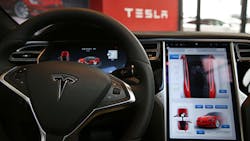Amid Investigation, Tesla Has No Plans to Disable Autopilot
Tesla does not plan to disable the Autopilot self-driving function in its cars despite accidents possibly linked to it, CEO Elon Musk told The Wall Street Journal.
As U.S. auto safety regulators moved forward in a probe of a fatal accident involving Autopilot in May, Musk said in an interview that owners of Tesla’s luxury electric cars need more education on using the technology.
“A lot of people don’t understand what it is and how you turn it on,” Musk said, stressing that the company has labeled the technology has not been perfected. “It says beta specifically so people do not become complacent.”
At least three recent accidents, one fatal, have involved drivers using Autopilot, though specifics of how much the drivers were still involved in piloting the cars at the time are not available.
On Tuesday, the National Highway Traffic Safety Administration published a letter sent to Tesla last week requesting the company to supply detailed information on the car involved in the deadly May 7 crash in Florida, including Tesla’s own analyses of what happened and of possible problems with Autopilot.
They also demanded all of Tesla’s records of other crashes and driver complaints, and details on the functioning of the cars’ automatic emergency braking system.
Musk has defended the company’s technology — the most advanced driver-assist system currently available to consumers — as, on the balance, being safer than regular cars, noting the Florida accident was the first fatality in a Tesla linked to Autopilot.
“This is the first known fatality in just over 130 million miles where Autopilot was activated. Among all vehicles in the U.S., there is a fatality every 94 million miles,” the company said on its website last week.
But worries have mounted that the feature has some faults, including not being able to recognize cars halted on the road, and that drivers are being lulled into a false sense of safety and not watching the road. In the Florida accident, the car slammed into the side of a tractor-trailer crossing the road in front of it apparently without braking at all.
The Journal has catalogued a number of accidents that Tesla drivers say were linked to Autopilot use, including a July 1 incident in Pennsylvania that US regulators are also reportedly looking into.
Nissan Introduces Similar Features
In related news, Nissan introduced a group of driver-assist features for its Japanese Serena model minivan. The ProPilot system allows drivers to accelerate, brake, navigate stop-and-go traffic on the highway, as well as send warnings to drivers when they remove their hands from the wheel, ultimately disabling if prompts are ignored for a few seconds.
Japan’s Transport Ministry recently said that dealers selling cars with driver-assist functions should remind consumers of their limits, noting that Tesla’s Autopilot system isn’t fully autonomous, and saying that drivers should be responsible in the event of accidents. The NHTSA is expected to announce guidelines as soon as this month that will set some parameters for self-driving cars.
The release of ProPilot follows other automakers, including Tesla, Daimler and Volvo, whose technologies allow their vehicles to handle complicated traffic conditions. Nissan plans to extend the availability of ProPilot to Europe with the Qashqai sport utility vehicle, as well as to the U.S. and China.
Toyota Motor Corp., Honda Motor Co. and Fuji Heavy Industries Ltd. all plan to introduce vehicles capable of driving themselves on highways by 2020. The Renault-Nissan Alliance has said it plans to launch more than 10 vehicles with autonomous-drive technology in the next four years.
Copyright Agence France-Presse, 2016
About the Author
Agence France-Presse
Copyright Agence France-Presse, 2002-2025. AFP text, photos, graphics and logos shall not be reproduced, published, broadcast, rewritten for broadcast or publication or redistributed directly or indirectly in any medium. AFP shall not be held liable for any delays, inaccuracies, errors or omissions in any AFP content, or for any actions taken in consequence.
IW Staff
Find contact information for the IndustryWeek staff: Contact IndustryWeek
